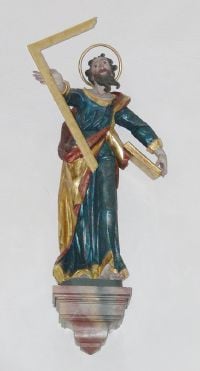Acts of Thomas
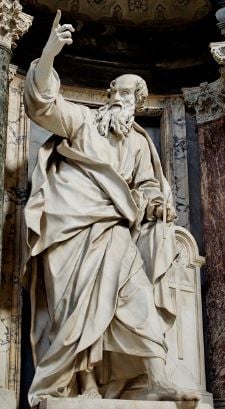
The Acts of Thomas is is one of the New Testament apocrypha, describing the adventures and martyrdom of the Apostle Thomas, whom it portrays as Jesus' twin brother. A highly entertaining literary work combining the genres of romance, travel journal, and hagiography, it was apparently a popular work, as it has survived in numerous manuscripts in several languages, despite its Gnostic depiction of Christ and its teaching of the femininity of the Holy Spirit.
The work provides dramatic narratives of Thomas' miraculous evangelistic adventures in India, where he traveled after being sold as a slave by the resurrected Jesus. It ends with Thomas' martyrdom as a result of the enmity of the monarch Misdaeus, whose wife and son Thomas converted to an ascetic form of Christianity. A major part of the drama relates to Thomas' teaching that married Christian couples must refrain from sex, leading to many conflicts, as well as opportunities for literary titillation. At the same time, its liturgical elements and poetry provide important insights into early Christian traditions, especially in Syria, where it was widely circulated and possibly written, probably in the early third century C.E. Embedded in the Acts of Thomas is a remarkable Syriac hymn, The Hymn of the Pearl, (also called the Hymn of the Soul), which gained popularity on its own in both mainstream Christian and Gnostic circles.
A lengthy and well constructed narrative, the Acts of Thomas is the most complete of several "Acts" relating to the Apostle Thomas, who plays a major role in Gnostic literature, while he is denigrated as "Doubting Thomas" in the canonical Gospels because he doubts Jesus' physical resurrection. It should not be confused with the Gospel of Thomas, which deals with Jesus' sayings in a Gnostic context, but contains almost no narrative elements.
Text
The complete versions of the Acts of Thomas that survive are in Syriac and Greek, and there are many surviving fragments of the text. Most scholars detect from the Greek that its original was written in Syriac, which places the author of the Acts of Thomas in Syria. The surviving Syriac manuscripts, however, have been edited to purge them of the most overtly Gnostic passages, so that the Greek versions reflect the earlier tradition. Some scholars thus argue that the Acts of Thomas were originally composed in Greek and soon translated rendered into Syriac. References to the work by the Church Father Epiphanius show that it was still in circulation in the fourth century.
Though no less an orthodox saint than Gregory of Tours (sixth century) made an expurgated version of the text, mainstream Christian tradition rejects the Acts of Thomas as pseudepigraphical, apocryphal, and heretical. However, it became a main basis for the traditions of Thomas' activities in India, and the Roman Catholic Church did not officially declare the Acts to be heresy until the Council of Trent in the sixteenth century.
Content
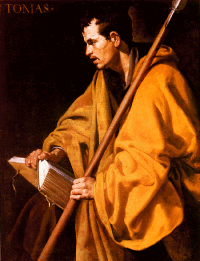
The text of the Acts of Thomas reads like a novel and is apparently crafted along the lines of Greek romances, complete with tantalizing sexual innuendo, dramatic plot twists, and fantastic tales of travels in foreign lands. It differs from it pagan literary counterparts, however, in that instead of uplifting and conjugal love, it stresses the ideal of chastity, even to the extent that true husbands and wives must abstain from the "corruption" of sexual intercourse and the error of procreation. This attitude was prevalent in some Gnostic circles, but also in some segments of the orthodox churches, which later evolved the tradition of monasticism to accommodate the ascetic tendency while encouraging marriage for the laity.
The plot brings a much-resistant Thomas to India, where his first act is to inspire the daughter and son-in-law of King Gundaphorus to abstain from sex on their wedding night and enter into a spiritual marriage with Jesus. He then teaches Gundaphorus himself what is truly valuable by giving away the money the king provided to build a new royal palace, thus constructing Gundaphorus a gorgeous abode in heaven.
Next, he battles a great serpent, who is either the Devil himself or his chief associate. Following this comes an adventure with a talking donkey, a dramatic exorcism of a powerful incubus from a beautiful woman, and the resurrection of a murdered girl whose lover, after hearing Thomas' teachings, killed her for refusing to join him in a life a chastity.
Moving to the neighboring realm of a certain King Misdaeus, Thomas involves himself in royal politics, converting first the king's military commander, then the prime minister's wife, and finally the king's own wife and son, among many others. As a result, he faces prison and torture, all the while involving himself in dramatic adventures, preaching lengthy sermons, engaging in formal Christian liturgies with a Gnostic twist, and performing many miracles.
In the end, knowing that physical life is nothing compared to what awaits him in the spiritual realm, Thomas faces martyrdom, but not without first having converted everyone of importance except the king and prime minister, both of whom are miserable because their wives refuse to sleep with them. After his death, however, even these two relent and exempt their wives from performing their conjugal duties.
Glorious martyrdom and the removal of sex from marriage seems to play the same role in this romance as a joyous wedding normally plays at the happy ending of such literature. Theologically, the text presents a Gnostic view of Jesus and the Holy Spirit. Christ is the ambassador of heaven sent to bring people out of darkness, while the Holy Spirit is the "hidden Mother," who gives birth to "twin young," hinting at Thomas' own rebirth‚ÄĒand that of all who understand the secret Truth‚ÄĒas divine souls. It may be in this sense, rather than a physical one, that Thomas is to be thought of as Jesus' twin.
Summary
1‚ÄĒThomas goes to India
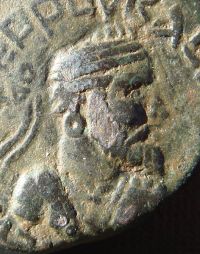
The apostles gather in Jerusalem, where each of them is assigned as an evangelist to a different region of the world by drawing lots. Thomas is assigned to India, but refuses to go, pleading weakness of health and also that, as a Jew, he cannot live among Gentiles. The resurrected Christ then sells Thomas‚ÄĒwho, like his twin brother Jesus, is a carpenter‚ÄĒas a slave to a merchant named Abbanes, the agent of King Gundaphorus of India. On arriving, Thomas attends the wedding feast of the king's daughter with his master. He declines food and drink, and refuses to gaze at a lovely flute-girl who dances for him. For his rudeness, he is struck by a royal cup-bearer. Thomas responds by bursting into a hymn of praise to the dancer and God, in which he prophesies the cup-bearer's death. The cup-bearer is soon killed by a lion while drawing water from a well, and the flute-girl, a Jew herself, immediately breaks her flute and becomes Thomas' first disciple.
The king hears of the miracle and asks Thomas to pray for the success of his daughter's marriage, she being an only child. At the bridal chamber, Thomas blesses the couple and prays to Jesus as "the ambassador that wast sent from the height… who showedst the way that leadeth up unto the height." However, when the groom enters the bridal chamber, he sees a vision of Jesus speaking with the bride. Jesus declares "if ye abstain from this foul intercourse, ye become holy temples." He explains that procreation is an error, since "children become useless, oppressed of devils… they will be caught either in adultery or murder or theft or fornication, and by all these will ye be afflicted." The couple immediately convert, committing themselves to "abstain from foul desire." In the morning, the bride tells her parents: "I am yoked unto a true husband," and her groom gives thanks to Jesus "who hast removed me far from corruption." The king is understandably upset and commands that Thomas, "the sorcerer," be apprehended.
2‚ÄĒKing Gundaphorus' palace
Thomas meets King Gundaphorus, who learns of his carpentry skills and commands him to build a new royal palace, leaving him with a substantial sum of money to complete the task. Thomas, however, gives the money away to the poor and the sick as an manifestation of God's love for them. The king then imprisons both Thomas and his master, declaring that they will be punished with death. The king's brother, Gad, then takes sick and dies. The angels carry him to heaven and show him a gorgeous house, which they explain was built there for Gundaphorus by Thomas. Gad receives permission to return to earth, where he attempts to buy the king's heavenly palace from him. Learning the true value of Thomas' actions, the king releases Thomas from prison and both the king and his brother humble themselves before Thomas, becoming disciples and devoting themselves to the care of the poor. Thomas seals their commitment with a sacrament of holy oil, reciting a liturgical psalm, and invoking the Trinity. In a Gnostic variation, however, he refers to the Holy Spirit as "Compassionate Mother… she that revealeth the hidden mysteries, Mother of the seven houses."
After this, Thomas continues his preaching, teaching all to "abstain from fornication and covetousness and the service of the belly."
3‚ÄĒThomas and the Great Serpent
On the road, Thomas encounters the dead body of a handsome youth. A huge black serpent (or dragon) emerges from a nearby hole and declares that he has killed the youth out of jealousy over the youth's sexual intercourse with a beautiful young woman with whom the dragon was enamored. The dragon knows that Thomas is Christ's twin brother and identifies himself as "the son to him that sitteth on a throne over all the earth" and also as he who "spake with Eve the things which my father bade me speak unto her." He also takes credit for inspiring Cain to kill Abel and binding the fallen angels in lust toward human women, in order that children might be born who would do his will. He boasts of hardening Pharaoh's heart, causing the Israelites to sin in the wilderness, and moving Judas Iscariot to deliver up Christ.
Unafraid, Thomas commands the beast to suck out the venom by which he has slain the youth. The young man revives, and the dragon swells up, bursts, and dies. The youth proclaims that he is now free of the lust that caused him to sin with the young woman. He then accompanies Thomas toward the city, and a great multitude of believers join the true faith.
4‚ÄĒThomas and the talking colt
A young donkey then approaches Thomas and miraculously speaks, addressing him as "Thou Twin of Christ." The colt invites Thomas to mount him and ride into the city. Thomas asks the colt about his origins, and he answers that he descends from the very ass who spoke to the prophet Balaam, and also from the donkey on whom Jesus rode when he entered Jerusalem.
Thomas, feeling humbled, declines the colt's offer, but the donkey insists, and Thomas finally consents to mount him. A huge throng of onlookers follows Thomas and the colt. Thomas dismounts and dismisses the ass at the city gate, whereupon the poor colt promptly falls down dead. The crowd implores Thomas to raise the beast from the dead, but he refuses, not because he is unable, but because the colt had already fulfilled his miraculous purpose by speaking and testifying to the work of God. The people then bury the colt by the side of the road at Thomas' command.
5‚ÄĒThe Devil's consort
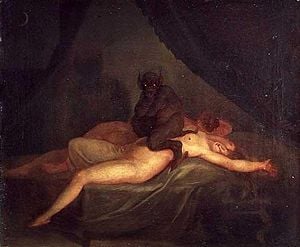
Thomas and his throng enter the city, where he is approached by a very beautiful woman, who explains that she has been tormented by the Devil for five years. The trouble began when a "young man" had "foul intercourse" with her in her dream, which he has continued to until the present time. Thomas is outraged at this and commands the Devil to come forth and face him. No one but Thomas and the woman can see the fiend, but all hear him as he shouts: "What have we to do with thee, thou apostle of the Most High! … Wherefore wilt thou take away our power?" Weeping, the Devil says to the woman: "I leave thee, my fairest consort… I forsake thee, my sure sister, my beloved in whom I was well pleased. What I shall do I know not."
He then vanishes, leaving behind only fire and smoke, which were seen by the astonished crowd. Thomas then blesses the crowd and seals the woman and many others in the name of the Trinity. Those who are sealed then partake of the Eucharist. Once again Thomas speaks of the Holy Spirit as feminine: "She that knoweth the mysteries of him that is chosen… she that manifesteth the hidden things and maketh the unspeakable things plain, the holy dove that beareth the twin young; Come, the hidden Mother… Come and communicate with us in this Eucharist which we celebrate in thy name and in the love."
6‚ÄĒThe misguided youth and his victim
A young man who has just taken the Eucharist is smitten with withered hands. He confesses that he had been in love with a young woman, but after hearing Thomas' teaching, he determined to refrain from having sex with her, asking her to join him in a spiritual marriage instead. When she refused, he murdered her with a sword, not being able to bear the thought of her having sex with another man. Thomas decries the "insane union" of unrestrained lust and commands the youth to bathe in holy water. They then go to the inn, where the victim's body lies. Thomas prays, and the young man takes his former lover by the hand, whereupon she comes back to life. She testifies that she has been in Hell, which she describes in considerable detail. Many people become believers as a result of the miracle and the woman's horrifying testimony.
7‚ÄĒThomas and Captain Siphor
The wealthy captain of King Misdaeus, later named as Siphor, asks Thomas to help his wife and daughter, who are being tormented by devils that throw them down and strip them naked, even in public. The two woman are so beset by these incubi that they have not been able to sleep or eat properly for three years. Greatly grieved for the man, Thomas first secures his commitment to Jesus and then agrees to help, converting many more believers through his public prayers.
8‚ÄĒExorcisms and wild asses
Thomas travels with Siphor in his chariot or coach, but the animals pulling the vehicle soon tire. At Thomas' suggestion, the captain goes to a nearby herd of wild asses and commands four of them, in Thomas' name, to come. Thomas then commands the asses to yoke themselves in the place of the wearied other animals. When the chariot arrives at the captain's home city, Thomas instructs one of the assess to command the devils to come forth. The ass promptly enters Siphor's house and does as Thomas commanded, and the women approach Thomas in a zombie-like state. When Thomas confronts them, they both fall down as if dead, but the spirit inside the older woman speaks. Thomas recognizes him as the same demon he had driven out of the woman in the previous city. The devil pleads that he is only doing what comes naturally to him. Surprisingly, the wild ass now gives a lengthy sermon urging Thomas to act and declaring the doctrine which Thomas normally preaches.
Thomas responds by praising Jesus, the "heavenly word of the Father … the hidden light of the understanding, who shows the way of truth, the driver away of darkness, and blotter-out of error." He then prays: "Let these souls be healed and rise up and become such as they were before they were smitten of the devils." The women are immediately healed. Thomas then leads the wild asses outside the city and dismisses then back to the natural life and a happy ending.
9‚ÄĒThomas and Mygdonia
Here in the realm of King Misdaeus, Mygdonia, the wife of Prime Minister Charisius, comes to learn of Thomas and his "new god." Because of her arrogant attitude in pressing through the crowd to see him, however, Thomas blesses the servants who carry her palanquin, rather than the great lady herself. He teaches the crowd to abstain first of all from adultery, which he characterizes as "the beginning of all evils." After listening to Thomas' long moral sermon, Mygdonia jumps from her chair and prostrates herself before the apostle. He urges her to rise and instructs her to take off her jewelry and other fine ornaments, and also to refrain from "polluted intercourse with thine husband."
Her husband Charisius later discovers Mygdonia in a depressed state, refusing both to dine or to sleep with him, pleading illness. The next day Charisius leaves home early to salute the king, while Mygdonia goes to attend Thomas. Trouble brews between the couple when Charisius learns of his wife's seeming infatuation with the stranger, whom she calls a physician, but he suspects is a sorcerer. That night she again refuses either to dine or sleep with her husband. "Thou hast no more any room by me," she informs him, "for my Lord Jesus is greater than thou, who is with me and resteth in me." The distraught Charisius cannot hide his anguish from King Misdaeus, who sends immediately for Captain Siphor to deal with the troublemaker. Siphor testifies to the king concerning Thomas' good works. Ultimately, Charisius himself confronts Thomas and brings him before the king. When Thomas refuses to answer the king's questions, he is sentenced to death. In prison, Thomas is not anxious at all. Instead, he sings the remarkable Hymn of the Soul (see below), a Gnostic psalm of remembrance of the value of the spirit and the worthlessness of all material things, including the body.
Charisius, thinking his troubles are over, finds Mygdonia in deep grief over Thomas' fate. Even his own tears do not move her, as she only sits silently looking at the ground during his impassioned entreaties. She insists again that her love is only for Jesus.
10‚ÄĒThe baptism of Mygdonia
Taking ten denarii to bribe Thomas' jailers, Mygdonia is miraculously met by an apparition of Thomas on her way. She is at first frightened, but after Thomas comforts and teaches her, she requests to be "sealed." Taking Thomas to her home, she receives the necessary elements for the ceremony from her nurse, Narcia. Thomas sanctifies her with holy oil, and she then comes to him clad only in a linen cloth to be baptized in a fountain of water. After dressing, she shares the Eucharist with him, and a voice from heaven declares "Yea, Amen!" Narcia, hearing the voice is also converted and receives baptism. Thomas then returns to prison.
The next morning at dawn, Charisius finds Mygdonia and her nurse praying: "O new god that by the stranger hast come hither unto us… turn away from us the madness of Charisius." He is outraged, imploring her to remember their love as bride and groom. She replies:
That bridal chamber is taken down again, but this remaineth always; that bed was strown with coverlets, but this with love and faith. Thou art a bridegroom that passest away and art dissolved, but Jesus is a true bridegroom, enduring for ever immortal. That dowry was of money and robes that grow old, but this is of living words which never pass away.
Charisius goes to the king and demands Thomas' death. King Misdaeus sends for Thomas and offers to let him go free if he will persuade Mygdonia to return to her husband. Back at Charisius' house, Thomas tells Mygdonia to obey Charisius, but she reminds the apostle of his own teaching, declaring that he has said this only "because thou art in fear." Thomas then leaves the house to stay with Captain Siphor, where Thomas baptizes the household and holds communion with them.
11‚ÄĒThomas and Tertia
Tertia, the wife of King Misdaeus, visits Mygdonia, who testifies to the truth of Thomas' teachings. Tertia immediately goes to Siphor's house and asks to partake in the promise of life that Thomas offers. He accepts her, and she returns to Misdaeus, who is understandably unhappy to hear that the teaching of the "sorcerer" now infects is own wife. He finds Charisius, and the two of them arrest Thomas again as he is teaching at Siphor's house. He is placed under guard awaiting trial by Misdaeus.
12‚ÄĒIuzanes, the son of Misdaeus'
Midaeus' son Iuzanes speaks with Thomas and is inspired to help him escape, but Midaeus returns, and Thomas faces trial. He insists that the king has no power over him, and that his fate in is God's hands. The king orders that Thomas be tortured with red-hot iron plates, but a huge spring of water rises up to quench their heat. The king now begs Thomas to pray that the resulting flood will subside, and Thomas complies. Midaeus sends Thomas back to prison, accompanied by Iuzanes and Siphor. Thomas prays once more, including a version of the Lord's prayer, this time seemingly in preparation for death. "I am thine," he declares to his Lord, "and I have kept myself pure from woman, that the temple worthy of thee might not be found in pollution."
13‚ÄĒThe baptism of Iuzanes
Iuzanes, who is chaste though married, wishes to become a disciple and requests that Thomas heal his ailing wife, Mnesara. Tertia, Mygdonia, and Narcia bribe the jailer to allow them entrance to the prison, where they join Iuzanes, Siphon, and Siphon's wife and daughter. Thomas and his band then go to Iuzanes' home, where Mnesara is quickly healed. Mygdonia anoints Mnesara, and Thomas anoints Iuzanes; then Thomas baptizes the couple, after which they share the Eucharist.
The Martyrdom of Thomas
Thomas returns to his prison, together with Tertia, Mygdonia, and Narcia. On the way, he declares to them and "the multitude" a final message in preparation for his departure. He stresses that they must focus on Christ, not himself, and should hope in his coming.
Misdaeus now places Thomas on trial again. The apostle confesses that he is the slave of Jesus. Taking him out of the city for fear of the crowds, the king commands four soldiers and an officer to take him to a nearby mountain and slay him there with spears. Iuzanes persuades the soldiers to allow Thomas to pray before his death. Thomas concludes his prayer and then invites the soldiers to do their duty. They pierce him with their spears, and he dies.
While Siphor and Iuzanes keep watch over his body, Thomas appears to them and asks: "Why sit ye here and keep watch over me? I am not here, but I have gone up and received all that I was promised." Thomas is buried with great honor, and with much mourning.
After this, the husbands of Mygdonia and Tertia badly mistreat their wives in a vain attempt to force them to perform their conjugal duty, but the two saints bravely hold up, and eventually their husbands allow them to live in chastity. Siphor becomes a presbyter and Iuzanes a deacon, and the church grows rapidly under their leadership. Thomas' bones are transferred to Mesopotamia, but even the dust where he lay possesses miraculous healing qualities. King Misdaeus, before his death, repents and receives forgiveness at the hand Siphor, amid much rejoicing.
The Hymn of the Soul
Embedded in the Acts of Thomas is a beautiful poetic statement of a Gnostic myth concerning the exile of the soul in the physical world and its ultimate redemption. Known variously as the Hymn of the Soul, the Hymn of the Pearl and the Hymn of the Robe of Glory. Thomas sings the hymn while praying in prison. Some scholars believe the hymn was written apart from the Acts and later inserted into the text, as it only appears in one Syriac manuscript and one Greek manuscript of the Acts. Its author is unknown, with the Syrian Gnostic teacher Bardaisan being the most frequently suggested candidate.
The hymn tells the story of a boy, "the son of the King of Kings," who is sent to Egypt to retrieve a pearl from a serpent. During the quest, he is seduced by Egyptians and forgets his origin and his family. However, a letter is sent from the King of Kings to remind him of his past. When the boy receives the letter, he remembers his mission, retrieves the pearl, and returns.
The hymn is commonly interpreted as the expression of the Gnostic view of the human condition, in which the human spirit trapped in a world of matter, forgetful of its true origin. The revelatory message delivered by the heavenly ambassador, in this case, Jesus Christ, reminds the soul of its true identity and enables it to fulfill its destiny.
The hymn was especially treasured in Manicheanism and was also admired by some orthodox Christian writers, who appreciated its spiritual message without fully comprehending its Gnostic implications.
See also
- Gnosticism
- Gospel of Thomas
- Apostle Thomas
- Encratism
- Book of Thomas the Contender
- Acts of Paul and Thecla
- Acts of John
ReferencesISBN links support NWE through referral fees
- Bremmer, Jan N. The Apocryphal Acts of Thomas. Studies on early Christian apocrypha, 6. Leuven [Belgium]: Peeters, 2001. ISBN 9789042910706.
- Ehrman, Bart D. Lost Scriptures: Books That Did Not Make It into the New Testament. New York: Oxford University Press, 2003. ISBN 9780195182507.
- Ferreira, Johan. The Hymn of the Pearl: The Syriac and Greek Texts: With Introduction, Translations, and Notes. Early Christian studies, 3. Sydney [Australia]: St. Pauls, 2002. ISBN 9780957748330.
- Huxley, George Leonard. Geography in the Acts of Thomas. Greek, Roman and Byzantine Studies. [Offprint]. Durham, N.C.: Duke University Press, 1983. OCLC 43216727.
- LaFargue, Michael. Language and Gnosis: The Opening Scenes of the Acts of Thomas. Harvard dissertations in religion, no. 18. Philadelphia: Fortress Press, 1985. ISBN 9780800670160.
External links
All links retrieved June 15, 2023.
- India and Apostle Thomas Acts of Thomas Ed. Menachery
- Early Christian Writings: Acts of Thomas
- The Gnostic Society Library: From the translation and notes by M. R. James in The Apocryphal New Testament, Oxford 1924.
Credits
New World Encyclopedia writers and editors rewrote and completed the Wikipedia article in accordance with New World Encyclopedia standards. This article abides by terms of the Creative Commons CC-by-sa 3.0 License (CC-by-sa), which may be used and disseminated with proper attribution. Credit is due under the terms of this license that can reference both the New World Encyclopedia contributors and the selfless volunteer contributors of the Wikimedia Foundation. To cite this article click here for a list of acceptable citing formats.The history of earlier contributions by wikipedians is accessible to researchers here:
The history of this article since it was imported to New World Encyclopedia:
Note: Some restrictions may apply to use of individual images which are separately licensed.
